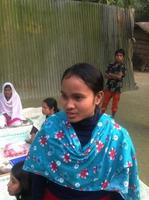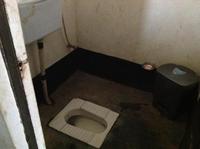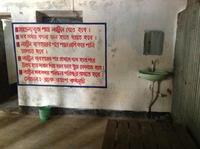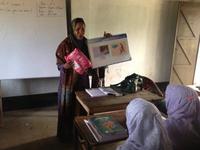Student Shahanaz Parveen can now openly talk about aspects of menstruation with other adolescent girls from her village and school.
Published on: 15/03/2013
We have meetings every three months, talking about issues such as sanitary napkins, safe water, latrines and hand washing.
Now she happily talks openly about menstruation, in a meeting with 20 other adolescent girls from her village and BRAC programme assistant Asma Khatun. “This is one of the five villages I cover,” Asma explains. “We have meetings every three months, talking about issues such as sanitary napkins, safe water, latrines and hand washing”.
Asma encourages the girls to discuss the problems they face. They come to these sessions with her, she says, because they see her as their “big sister”.

Shahanaz and the other girls in her school now don’t have to miss out on an education, as their school is one of the 4,000 in Bangladesh which, since 2008, has constructed separate toilet facilities for girls as a result of the BRAC WASH programme.
Another is the Batajore B M High School in Bhaluka sub-district, a 2.5 hour drive from Dhaka. The headmaster, Mr Mohammad A Kuddus, explains that the two toilets and wash basins which were installed to serve the 400 girls of the school cost 50,000 taka (around €500), of which BRAC provided 35,000 taka.

The toilets have a bin where girls can dispose of sanitary napkins. When the bin is full, the napkins are emptied and burnt in containers located in corner of the school compound. The washbasins have soap, and the wall has a poster with five hygiene messages.
Monitoring the cleanliness and use of the toilets is one of the functions of the school WASH committee and the student brigade. The brigade has 24 members, eight of them – two from each class of years 6 to 9 – trained by BRAC.

The WASH committee’s 14 members, among them eight trained by BRAC, includes teachers, parents, representatives from the school management committee and the school cleaner. The committee has overall responsibility for managing, maintaining and mobilising funds for the school’s sanitation.
Weekly hygiene lessons, lasting 45 minutes, are compulsory at the school. They are run by Mrs Saifun Nahar, who also offers BRAC’s sanitary napkins for sale to the students at a cost of 48 taka for a pack of 10 – cheaper than commercially branded products, which sell at the local market for more than 70 taka.
BRAC has found that many girls who are comfortable buying sanitary napkins from their school would be too embarrassed to do so at the market.
BRAC’s Sanitary Napkin and Delivery Kits Production Centre has been supplying health volunteers with affordable, biodegradable napkins since 1999, to meet the public health needs of schoolgirls and poor women in rural areas. Apart from the cost difference, BRAC has found that many girls who are comfortable buying napkins from the school would be too embarrassed to do so at the market.

At IRC we have strong opinions and we value honest and frank discussion, so you won't be surprised to hear that not all the opinions on this site represent our official policy.